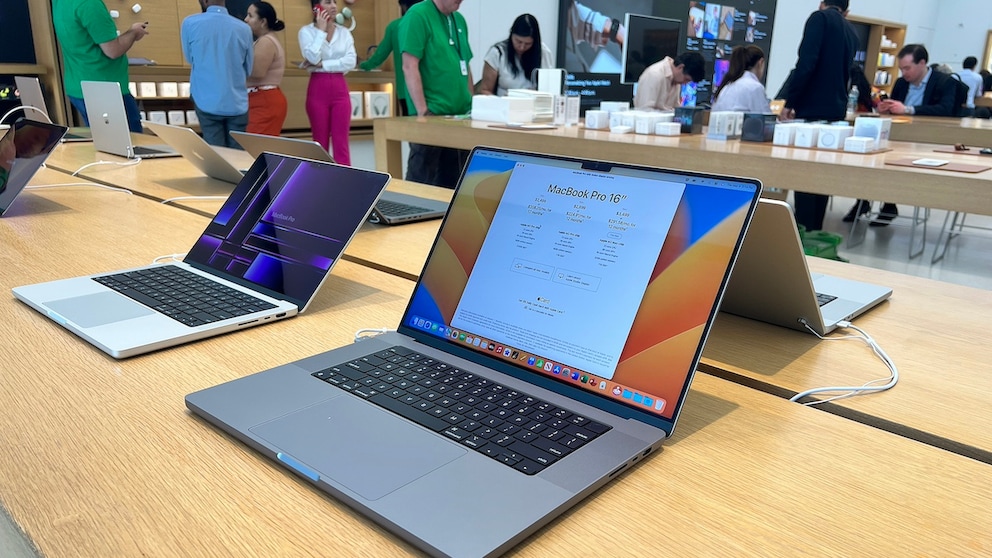April 22, 2025, 12:21 pm | Read time: 3 minutes
The terms laptop and notebook are often used interchangeably, but there are some minor differences between the devices. TECHBOOK explains what these are and what you should look out for when making a purchase.
Laptops and notebooks are both portable computers that are often similar in appearance. While laptops originally started out as powerful alternatives to desktop PCs, notebooks are more compact and lighter, making them ideal for mobile use. However, in today’s technology world, the boundaries between a laptop and a notebook are becoming increasingly blurred.
What Is a Laptop?
If you look at the development of compact portable computers, it all started with laptops. These devices come with a keyboard, touchpad and integrated display. In contrast to notebooks, they were originally designed as powerful desktop replacements and are usually equipped with more powerful processors, more storage space and larger screens. This makes them particularly suitable for demanding applications such as video editing, gaming, or professional software.
What Exactly Is a Notebook?
A notebook, on the other hand, is in some ways a lighter, slimmed-down version of a laptop. The essential functions of a desktop PC are also combined in a foldable housing. Notebooks are optimized for mobile use, have an integrated keyboard, a touchpad or trackpad as a mouse replacement and generally offer a long battery life. They are lighter than classic laptops and ideal for basic tasks such as web research or office applications.
Differences Between a Laptop and a Notebook
Due to technological developments, the boundaries between notebooks and laptops have almost disappeared. Many manufacturers and users now use the terms synonymously, so that the difference can often only be determined by certain characteristics:
Size and Weight:
- Laptop: tends to be larger and heavier (up to 17 inches screen size).
- Notebook: smaller and lighter (typically 13 to 15 inches).
Performance:
- Laptop: often more powerful hardware for demanding applications
- Notebook: initially intended for simple tasks, but modern notebooks often offer similar performance to laptops.
Design and Features:
- Laptop: more connections, often with external graphics card and more powerful cooling
- Notebook: more compact, fewer connections, but often better battery life
Battery:
- Laptop: needs to be charged more often because it is generally more energy-intensive.
- Notebook: Often has longer battery life (up to 12 hours).
Memory:
- Laptop: often offers larger hard disks for more memory.
- Notebook: tends to rely on fast SSDs for quicker access times and has an integrated graphics processor.
To summarize, laptops are ideal for users who need a lot of computing power but don’t want a stationary PC. Notebooks, on the other hand, are perfect for mobile use on the move. Many backpack and bag sizes are now based on the standard notebook formats and even have an extra compartment for the technical device. Due to their intended use, notebooks are also often more energy efficient.

Almost everyone does it! This error destroys your laptop battery

Acer shows its first handheld console at IFA

Lenovo Presents ThinkBook Flip — a Laptop with a fFolding Display
Which Is Better, Laptop or Notebook?
The decision as to whether you should buy a laptop or a notebook depends on your individual requirements. A notebook is sufficient for simple office or university work or is even recommended if you often want to take the device with you on the go. If, on the other hand, you are looking for a mobile replacement for a stationary PC, then you should look at the laptop segment. The hardware is more powerful and also enables demanding applications such as gaming and video editing.
Laptops are generally more expensive than notebooks because they often have larger screens and more powerful components. Nevertheless, there are attractively priced notebooks with good features for everyday use, while high-end laptops for special applications are in a higher price range.
However, whether you are looking for a laptop or a notebook, the differences today are relatively minor. Pay attention to performance, mobility, and price to find the right device for your needs.

